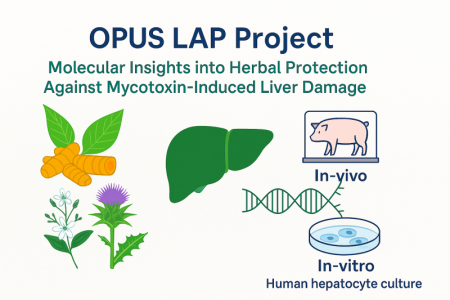NCN-Opuslap-DFG international research project
NCN-OPUSLAP-DFG international project is funded by the NCN, Krakow, Poland, and DFG, Germany.
Molecular Insights into Herbal Protection Against Mycotoxin-Induced Liver Damage
Welcome to the official project site of OPUS LAP — an interdisciplinary, multi-institutional research initiative investigating the hepatoprotective effects of bioactive compounds from traditional medicinal herbs against Aflatoxin B1-induced liver dysfunction.
 About the Project
About the Project
The OPUS LAP project explores how natural herbal extracts from Curcuma longa (Turmeric), Silybum marianum (Milk Thistle), and Andrographis paniculata (Green Chiretta) can protect the liver from damage caused by Aflatoxin B1 (AFB1) — a highly toxic mycotoxin frequently found in contaminated food and animal feed.
Through an innovative combination of in-vivo piglet models and in-vitro hepatocyte cultures (human and porcine), our team is conducting multi-Omics analyses to unravel the molecular mechanisms by which these herbs mitigate liver damage, restore mitochondrial function, and support detoxification pathways.
 Our Scientific Goals
Our Scientific Goals
-
Understand how AFB1 disrupts liver metabolism and gene expression.
-
Investigate the protective effects of herbal extracts at molecular and cellular levels.
-
Profile transcriptomic, proteomic, metabolomic, and miRNA changes.
-
Use siRNA gene knockdown to validate key genes in detoxification and stress response.
-
Compare pig and human hepatocyte responses for translational insights.
 Methodology
Methodology
We integrate advanced omics platforms and molecular techniques:
-
mRNA-seq, miRNA-seq (Next-Gen Sequencing)
-
Proteomics (2-DE, LC-MS/MS)
-
Metabolomics (UHPLC-QExactive Orbitrap)
-
Bioinformatics (GO/KEGG, WGCNA, MOFA, DIABLO)
-
siRNA validation and RT-qPCR
-
Histopathology, blood biochemistry, and liver function tests
Our approach connects molecular data across different biological levels to provide a holistic understanding of liver responses to both toxins and therapeutic herbs.
 Impact
Impact
The OPUS LAP project is highly relevant for:
-
Human and veterinary health: Addressing mycotoxin-related liver diseases.
-
Food safety and animal nutrition: Supporting healthier feed strategies.
-
Natural medicine: Advancing the use of herbal supplements for liver protection.
-
Climate change adaptation: Tackling increased fungal contamination in crops.
 Consortium Partners
Consortium Partners
-
Nicolaus Copernicus University, Toruń (Lead)
-
University of Warmia and Mazury, Olsztyn
-
West Pomeranian University of Technology, Szczecin
-
Institute of Genetics and Animal Biotechnology, Jastrzębiec
-
University of Life Sciences, Lublin
-
Leibniz Institute for Farm Animal Biology (FBN), Dummerstorf, Germany
 Vision for the Future
Vision for the Future
By combining traditional herbal knowledge with modern molecular science, OPUS LAP aims to pave the way for novel nutritional therapeutics and precision feeding strategies to safeguard liver health in a toxin-exposed world.


